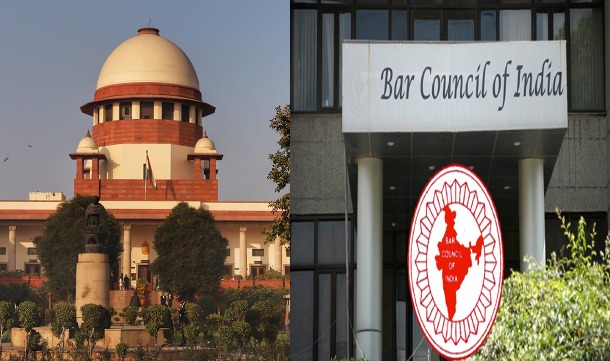
The Supreme Court expressed its disappointment on Tuesday that the Bar Council of India (BCI) had not been able to finalize guidelines for disciplinary action against lawyers who go on strike.
A bench comprising of Justice Dinesh Maheshwari and Justice Sanjay Kumar stated that it would be forced to punish lawyers who refused to work in court.
When the BCI counsel sought more time to file a detailed affidavit incorporating suggestions of State Bar Councils in the matter, Justice Maheshwari noted,
“You have to take this seriously. If members of the Bar Council of India cannot see the urgency [in this matter] then we will have to appoint another body. Harish Uppal (2002) was rendered by this Court when, sir? And where are we now? You are the body responsible, sir. If anything of this nature has happened then you must act.”
The bench subsequently adjourned the matter for further hearing on April 17 and requested the BCI to explain whether State Bar Councils were causing any problems.
The Bench was considering a contempt petition lodged by the NGO Common Cause, which sought action against lawyers who refused to work in court.
Advocate Prashant Bhushan, who appeared for the petitioners, stated that because Bar Council members are elected, resolutions or suspensions against lawyers on strike are withdrawn on the eve of elections.
When requesting alternative methods for forming Bar Councils, Justice Maheshwari stated,
“You may be right on one aspect that so far as strike is concerned, which is an anathema to our system. Bar councils have not been found keen to take up the matter on the disciplinary side and to their logical conclusion.”
The Apex Court had conveyed its displeasure with the BCI in January for its failure to take effective efforts to avert lawyers’ strikes across the country.
Justice Maheshwari then stated,
“We need specific, concrete preventive measures. This not a process that we will allow to happen at your own leisurely pace. 20 years later, are we here to still execute? More than 10 orders passed. What is left for the system? Parallel proceedings to always go on? There should be least amount of litigation it should require.”
It was alleged that the BCI was not upholding its own resolutions in this regard or considering the need for disciplinary action when the case was heard in 2019. The top court then ordered the BCI to submit a thorough affidavit detailing the status of various disciplinary cases across the nation, including those that are pending before State Bar Councils.
The Court had expressed concern about the BCI’s inability to stop strikes by lawyers in December.
In November, another bench condemned demonstrations and court boycotts by lawyers from district bar organisations in western Odisha who are calling for a permanent Orissa High Court bench in Sambalpur.




